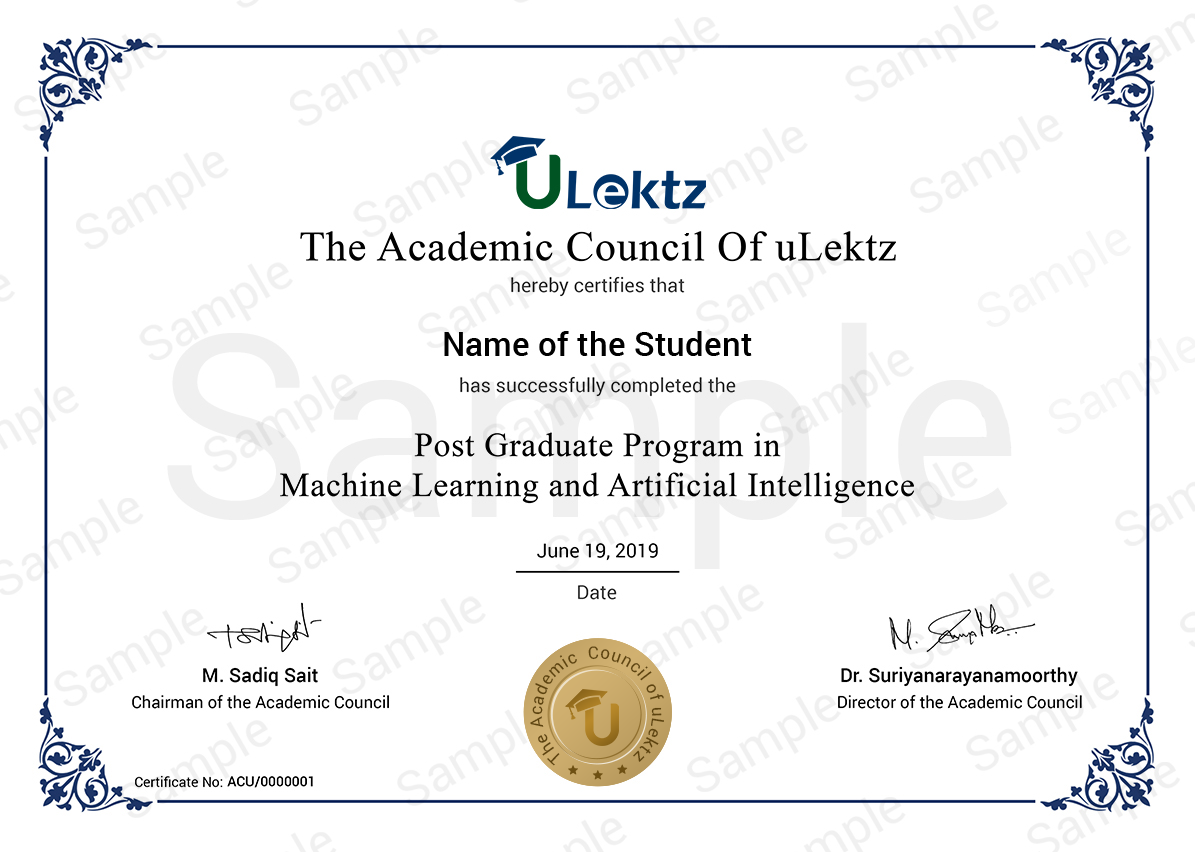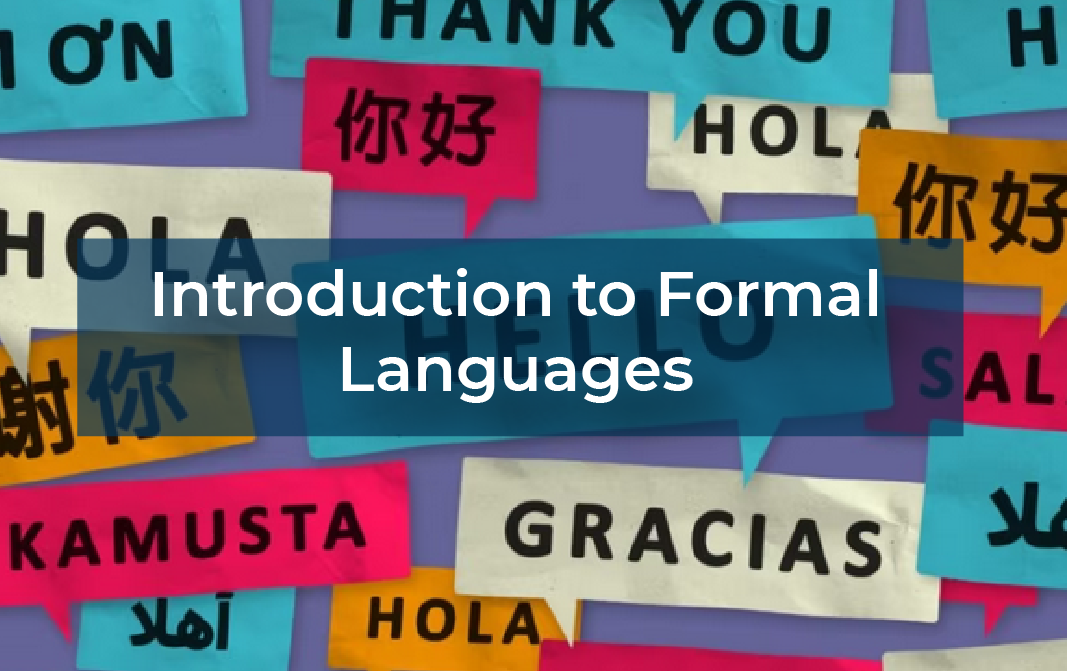

Note: Please check your Spam or Junk folder, in case you didn't receive the email with verification code.
Non-Linear: Random Order
This course provides students with concepts of Fundamentals of Automata- Computation, Finite State Machine, Automata Classification, Automata in Real World, Formal Language Theory- Symbols, Alphabets and Strings, Operations on Strings, Formal Languages, Operations on Languages and Formal Languages/ Grammar Hierarchy: Formal Languages, Regular Language, Context-Free Language, Context-Sensitive Language, Recursive Language, Recursively Enumerable Language, Other Forms of Form
1.Will familiarize about Equivalent Finite-State Automata, Equivalence of NFA/NFA- ɛ and DFA, Equivalence of NFA, with Є moves to NFA, without Є - moves.
2.Will demonstrate Two way DFA, DFA Vs 2DFA
3.Will develop knowledge in implification of Context – Free Grammar: Simplification of Context-Free Grammars, Elimination of Є -Productions
There is no particular prerequisite to learn Formal Languages, you will be able to do very well, if you have these basic skills:
1. Basic Analytics Skills
2. Good Understanding Skills
3. Good Communication Skills
. 1.1 Fundamentals of Automata- Computation, Finite State Machine
1.1 Fundamentals of Automata- Computation, Finite State Machine
 1.2 Components of Finite State Automata
1.2 Components of Finite State Automata
 1.3 Automata Classification, Automata in Real World
1.3 Automata Classification, Automata in Real World
 Fundamentals of Automata
10 Questions
Fundamentals of Automata
10 Questions
 2.1 Formal Language Theory- Symbols, Alphabets and Strings, Operations on Strings, Formal Languages, Operations on Languages
2.1 Formal Language Theory- Symbols, Alphabets and Strings, Operations on Strings, Formal Languages, Operations on Languages
 2.2 Formal Languages/ Grammar Hierarchy: Formal Languages, Regular Language, Context-Free Language, Context-Sensitive Language, Recursive Language, Recursively Enumerable Language, Other Forms of Form
2.2 Formal Languages/ Grammar Hierarchy: Formal Languages, Regular Language, Context-Free Language, Context-Sensitive Language, Recursive Language, Recursively Enumerable Language, Other Forms of Form
 2.3 Relationship between Grammars and Languages
2.3 Relationship between Grammars and Languages
 Formal Language Theory and Formal Languages / Grammer Hierarchy
10 Questions
Formal Language Theory and Formal Languages / Grammer Hierarchy
10 Questions
 3.1 Finite Automata: Introduction, Deterministic Finite Automata(DFA), Design of DFAs, Non Deterministic Finite Automata(NFA), Non-Deterministic Automata with Є-moves ,Design of NFA- Є s, Advantages o
3.1 Finite Automata: Introduction, Deterministic Finite Automata(DFA), Design of DFAs, Non Deterministic Finite Automata(NFA), Non-Deterministic Automata with Є-moves ,Design of NFA- Є s, Advantages o
 3.2 Equivalent Automata: Equivalent Finite-State Automata, Equivalence of NFA/NFA- ɛ and DFA, Equivalence of NFA, with Є moves to NFA, without Є - moves.
3.2 Equivalent Automata: Equivalent Finite-State Automata, Equivalence of NFA/NFA- ɛ and DFA, Equivalence of NFA, with Є moves to NFA, without Є - moves.
 Finite Automata and Equvalent Automata
10 Questions
Finite Automata and Equvalent Automata
10 Questions
 4.1 Minimization/ Optimization of DFA: Optimum DFA, Minimal DFA
4.1 Minimization/ Optimization of DFA: Optimum DFA, Minimal DFA
 4.2 Two way DFA, DFA Vs 2DFA
4.2 Two way DFA, DFA Vs 2DFA
 4.3 Finite Automata and Regular Expressions:Properties of Regular Sets and Regular Languages, Arden’s Theorem
4.3 Finite Automata and Regular Expressions:Properties of Regular Sets and Regular Languages, Arden’s Theorem
 Minimization/ Optimization of DFA, Regular Expressions and Languages and Finite Automata and Regular Expressions
10 Questions
Minimization/ Optimization of DFA, Regular Expressions and Languages and Finite Automata and Regular Expressions
10 Questions
 5.1 Transducers: Moore Machine, Mealy Machine, Difference between Moore and Mealy Machines, Properties / Equivalence of Moore and Mealy Machines
5.1 Transducers: Moore Machine, Mealy Machine, Difference between Moore and Mealy Machines, Properties / Equivalence of Moore and Mealy Machines
 5.2 Simplification of Context – Free Grammar: Simplification of Context-Free Grammars, Elimination of Є -Productions
5.2 Simplification of Context – Free Grammar: Simplification of Context-Free Grammars, Elimination of Є -Productions
 5.3 Elimination of Unit Productions, Normal Forms for Context Free Grammars, Chomsky Normal Form, Greibach Normal Form, Chomsky Vs Greibach Normal Form, Application of Context- Free Grammars
5.3 Elimination of Unit Productions, Normal Forms for Context Free Grammars, Chomsky Normal Form, Greibach Normal Form, Chomsky Vs Greibach Normal Form, Application of Context- Free Grammars
 Transducers, Context Free Grammers and Context-Free Languages and Simplification of Context Free - Grammer
10 Questions
Transducers, Context Free Grammers and Context-Free Languages and Simplification of Context Free - Grammer
10 Questions
 6.1 Turing Machine: Introduction, Components of Turing Machine, Description of Turing Machine
6.1 Turing Machine: Introduction, Components of Turing Machine, Description of Turing Machine
 Turing Machine and TM Extensions and Languages
10 Questions
Turing Machine and TM Extensions and Languages
10 Questions
 Final Assessment
20 Questions
Final Assessment
20 Questions
The certificate issued for the Course will have
Only the e-certificate will be made available. No Hard copies. The certificates issued by Global uLektz Academy. can be e-verifiable at www.ulektzskills.com/verify.



 60 hours Learning Content
60 hours Learning Content 100% online Courses
100% online Courses English Language
English Language Certifications
Certifications